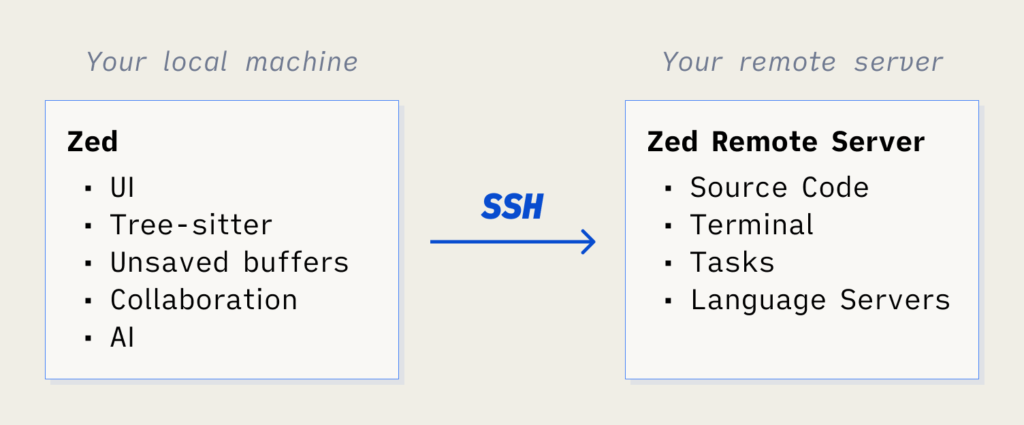# Remote Development
Remote Development allows you to code at the speed of thought, even when your codebase is not on your local machine. You use Zed locally so the UI is immediately responsive, but offload heavy computation to the development server so that you can work effectively.
## Overview
Remote development requires two computers, your local machine that runs the Zed UI and the remote server which runs a Zed headless server. The two communicate over SSH, so you will need to be able to SSH from your local machine into the remote server to use this feature.

On your local machine, Zed runs its UI, talks to language models, uses Tree-sitter to parse and syntax-highlight code, and store unsaved changes and recent projects. The source code, language servers, tasks, and the terminal all run on the remote server.
> **Note:** The original version of remote development sent traffic via Zed's servers. As of Zed v0.157 you can no-longer use that mode.
## Setup
1. Download and install the latest [Zed](https://zed.dev/releases). You need at least Zed v0.159.
1. Use {#kb projects::OpenRemote} to open the "Remote Projects" dialog.
1. Click "Connect New Server" and enter the command you use to SSH into the server. See [Supported SSH options](#supported-ssh-options) for options you can pass.
1. Your local machine will attempt to connect to the remote server using the `ssh` binary on your path. Assuming the connection is successful, Zed will download the server on the remote host and start it.
1. Once the Zed server is running, you will be prompted to choose a path to open on the remote server.
> **Note:** Zed does not currently handle opening very large directories (for example, `/` or `~` that may have >100,000 files) very well. We are working on improving this, but suggest in the meantime opening only specific projects, or subfolders of very large mono-repos.
For simple cases where you don't need any SSH arguments, you can run `zed ssh://[<user>@]<host>[:<port>]/<path>` to open a remote folder/file directly. If you'd like to hotlink into an SSH project, use a link of the format: `zed://ssh/[<user>@]<host>[:<port>]/<path>`.